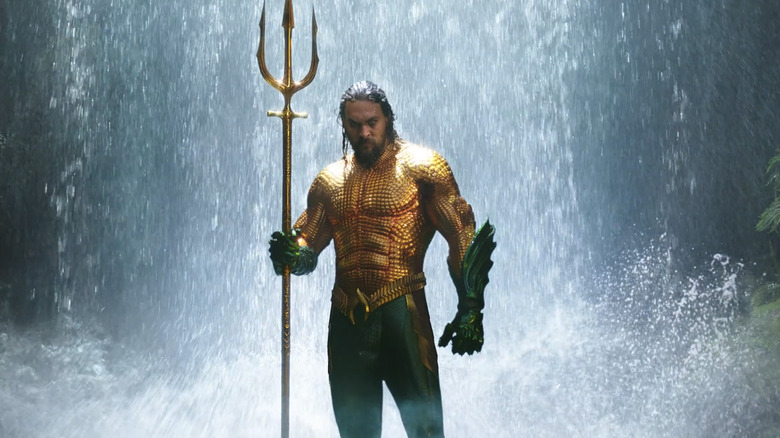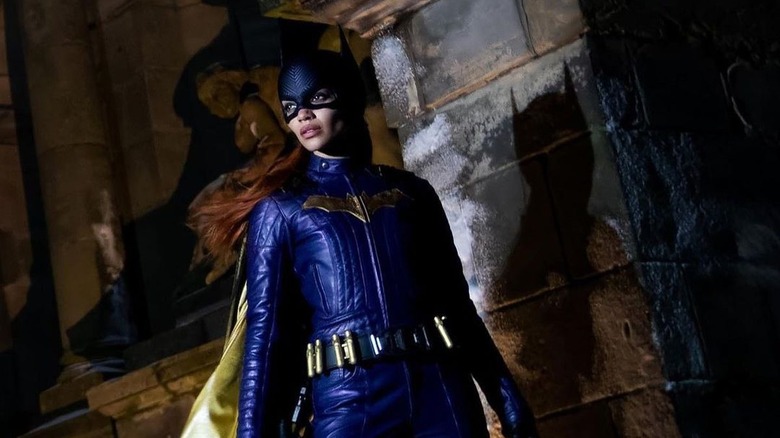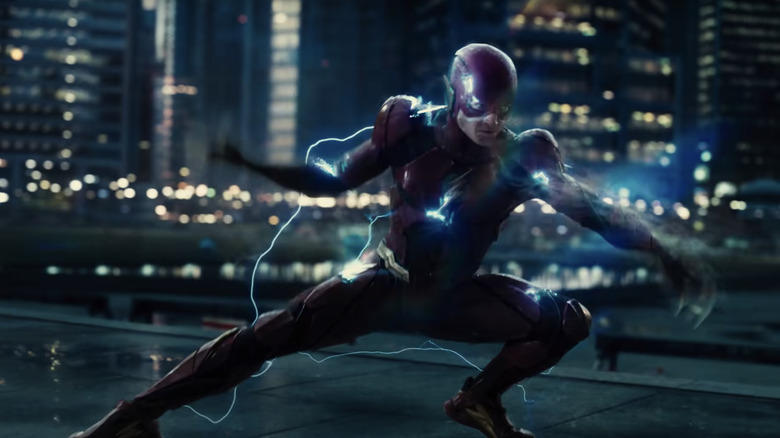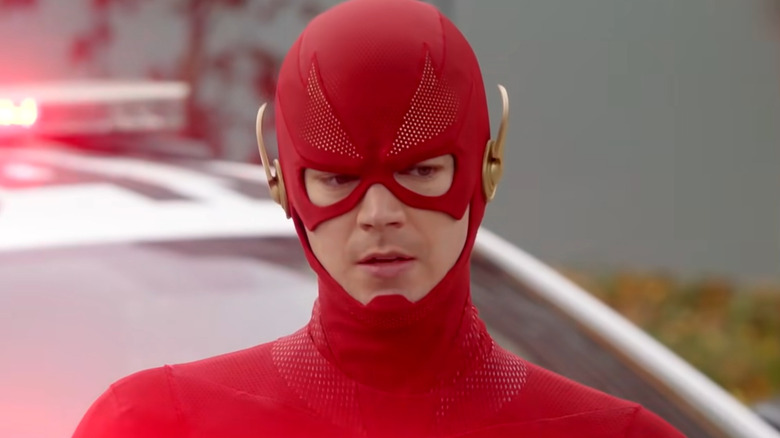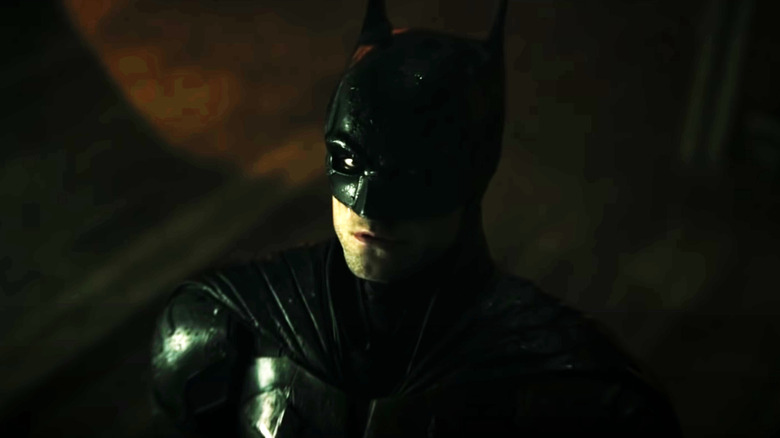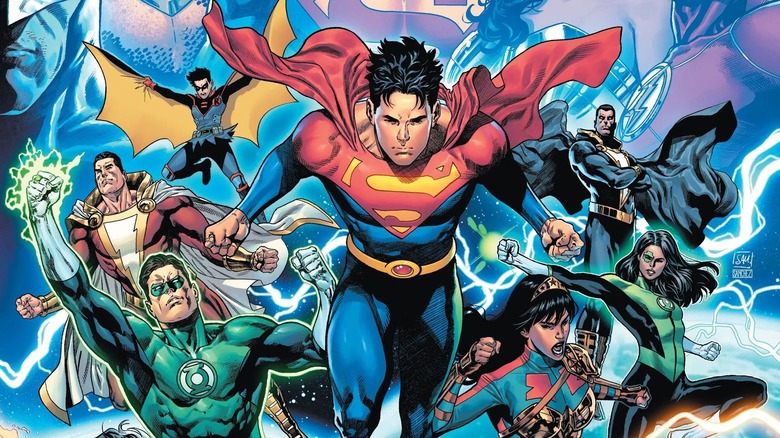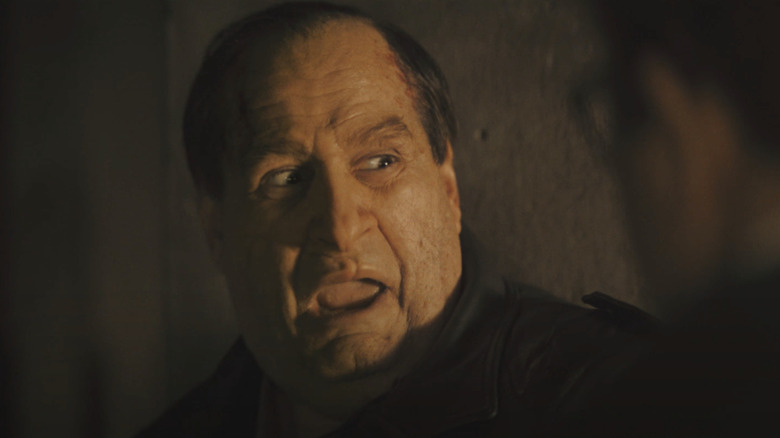Is The DC Cinematic Universe Heading For A Total Reboot?
When the news broke that Warner Bros. had completely scrapped any kind of release for the nearly completed "Batgirl" film and the "Scoob" sequel, it has set a dangerous precedent for how major Hollywood studios can utilize the works by dedicated artists for their own financial maneuvering. "Batgirl," starring Leslie Grace as the titular character, was a $90 million movie now being canned simply to become a tax write-off. Also, it just so happened to be a film made by DC Entertainment, the only comic book juggernaut that could possibly rival Marvel Studios, and connects to the company's most popular character, Batman. The film was even set to see the return of Michael Keaton as the Caped Crusader thirty years after he last wore the cowl.
We cannot yet be sure of the ramifications this decision will have on the industry as a whole, but what we can do is wildly speculate. To narrow our focus even further, we can discuss how this affects the DC Cinematic Universe. If WB is so willing to shelve a film within that universe, does that signal a major change of direction for what the company wants to do with its superhero properties? Are we heading towards a total reboot? Perhaps "Batgirl" was just the first domino to fall in DC and more are coming. Marvel clearly has a stranglehold on the superhero media culture, and DC may need to retool everything to meet them. Let's speculate about where DC goes from here.
The writing was on the wall
Companies are finally realizing that spending loads of money on projects meant exclusively for a single, subscription-based streaming service is completely unsustainable. We've seen the tanking of the stock prices and subscriber count of Netflix over the last few months. Alongside that, we have seen a boom in the box office as people have seemingly just accepted that they will inevitably get COVID-19 at some point. It turns out that having people pay individually for one showing of a movie in a theater generates much more revenue than putting something on a service that can be watched an infinite amount of times at no additional cost to an existing subscriber. I could have told you this long ago, but these giant corporations got so roped into the streaming world that they became blinded by the endless content churn.
DC deciding to make "Batgirl" for HBO Max rather than for theaters just shows how content is all it wanted. The guaranteed slam dunk successes get the big, splashy, theatrical treatment, and everything else is a number on ledger. (Not to mention, you had the terrible optics of making the first superhero film of the modern era with a woman of color as the titular lead and pushing it out of theaters entirely from the start.)
We probably should have known something was wrong when DC showed up to San Diego Comic-Con this year and showed nothing from "Batgirl." They didn't show much outside of the new trailers for "Black Adam" and "Shazam! Fury of the Gods" and announced no new films. Contrast that to Marvel's Phases 5 and 6 announcement. Marvel left the convention with a shout and DC, a whimper. Clearly, something was amiss.
What's happening with DC's announced slate?
Outside of "Batgirl," DC has five movies on their slate at some stage of production, and as far as we know, they are still set to come out. We have "Black Adam" and "Shazam! Fury of the Gods" in 2022 and "Aquaman and the Lost Kingdom," "The Flash," and "Blue Beetle" (also meant for HBO Max) in 2023. In the proper DC Universe, this is all we know for sure (we'll get to "The Batman" and "Joker" later). It's not like a major film company to have such a short-sighted slate of projects. Marvel has carved out dates through 2025 for its upcoming titles, a lot of which don't even have filmmakers attached yet.
The biggest question mark of them all is "The Flash," a movie WB has struggled to make for years now. In that time, what the studio probably didn't see coming was how much of a toxic force Ezra Miller would become. The actor has been arrested several times in the last year and has been accused of things ranging from violent assault to grooming of underage people. "The Flash" was taking inspiration from the "Flashpoint" comic book event by Geoff Johns, which acted as a kind of reboot to the comic books, and presumably, "The Flash" was to do something similar for the films, making it a rather crucial piece to what they were building. Considering these allegations against Miller, making the actor the centerpiece of one film, let alone a key figure in DC's future, complicates matters exponentially.
What happens to "The Flash" will be the true sign of DC starting from scratch. Canceling "Batgirl" is big, but it was never meant to be a premiere blockbuster. If "The Flash" gets the can, everything is up in the air.
The Arrowverse is also ending
While not as high-profile as the films, we are quietly seeing the end of another era for DC. This time, it is on television over on The CW. The "Arrowverse," which began a decade ago with "Arrow," is closing up shop with the forthcoming ninth and final season of "The Flash," starring Grant Gustin as the titular speedster. With 699 episodes across six different television series, the "Arrowverse" will have delighted millions of fans, and many will be sad to see it go.
This ending could be seen as a closing a chapter on a rather unique era of young adult television, or more cynically, it could be seen as DC further chipping away at its properties across various media platforms. Why should they be spending money on a somewhat niche show on a basic cable station when these characters would do so much more for them up on the big screen? Whatever the true reason, this little corner of the DC Universe is coming to an end.
What does a reboot look like?
DC started off wanting to build their own cinematic universe, just like Marvel. As the years went on, the films quickly pivoted further away from forming a cohesive whole, due in large part to the initial run of Zack Snyder-directed films being generally not liked. By the time "Aquaman" and "Shazam!" come along, only glancing references are made to the rest of the films. Then DC decided to make "Joker," an R-rated movie completely unconnected from all the other DC films. It made over one billion dollars and won Oscars. This year, we had Matt Reeves' "The Batman," unconnected from both the DC Universe and "Joker," and it was incredibly successful. Sequels for both projects have been announced, with "Joker: Folie à Deux" reportedly even being a musical.
If DC was to reboot, would these two specific franchises also fall victim to the chopping block? Considering they are well-liked, successful commodities, my gut tells me "no." How DC chooses to implement these films shows what kind of reboot would occur. From my perspective, there are two different options. The first would be to use the grimy, dark visions these two movies presented as the springboard for the rest of the universe. I don't think this will be WB's tactic. The company already tried that with Snyder's dark aesthetic, and it didn't work. Also, could you even imagine Superman standing next to Robert Pattinson's Batman? I don't think so.
I think the second option is much better: Have a clearly defined multiverse. "The Batman" exists in one, "Joker" exists in another, and another would have different versions of those same characters. In an ideal world, it would allow filmmakers more freedom to use the DC characters however they please without worrying about fitting into each other.
Who doesn't love synergy?
For another clue that a full reboot may be in the works for the movies, we can look to their source material: the comic books. DC Comics is currently in the midst of a big event series that will run through the end of 2022 called "Dark Crisis on Infinite Earths," written by Zach Williamson, which is the fallout of the death of the Justice League. This series is a sequel to "Crisis on Infinite Earths," which ran from 1985-1986 and is one of the most famous, most loved, and most important comic book stories in history. It served to dismantle the multiverse in the comics and create a unified continuity for all of DC's titles. If you have ever wanted to get into DC comic books and someone suggests you start reading "post-Crisis," this is what they mean. What we think about when we think of DC Comics comes after this.
As we do not know the end of the "Dark Crisis" story yet (issue #3 of 7 was released the day this was published), there is a chance that the result of the story will be the opposite of what happened in the original, where they fully embrace the multiversal aspects of the comic books. Synergistically, this would work well for my proposition of a reboot on the film side. DC is looking to consolidate all of its platforms, and lining up these two revamps alongside each other fits that model. It would garner vast amounts of attention for both mediums, and considering how much they are lagging behind Marvel both on screen and on the page, DC would definitely benefit from that attention.
What are you doin' DC?! Come on!
After all of this rampant speculation, one thing is totally clear: DC is in complete disarray. Somehow in my speculation, I both say they want to consolidate and want to expand into a multiverse where anything is possible. They want to make their films theatrical events, but they won't release "Batgirl" in theaters. The possibility of Ezra Miller being the lead of a major motion picture for DC is still on the table. DC is a total mess right now.
Rebooting everything might be the best option. Things couldn't get worse, from a business planning perspective, than they are going right now, and saying, "You know what? F*** it," and tearing it all down might be exactly what DC needs.
All we can do now is feel incredibly sad for directors Adil El Arbi and Bilall Fallah, as well as the entire cast and crew of "Batgirl," that WB and DC are treating their film like trash and not a piece of art hundreds of people put their heart into, which is what it actually is. I hope that at some point down the line they get to put their movie in front of an audience, and I hope it is great.
As for WB and DC, they have a lot of stuff to figure out, and I expect many filmmakers will be unwilling to work with them after what has transpired here. DC may want to reboot, but good luck finding people who want to step in.
